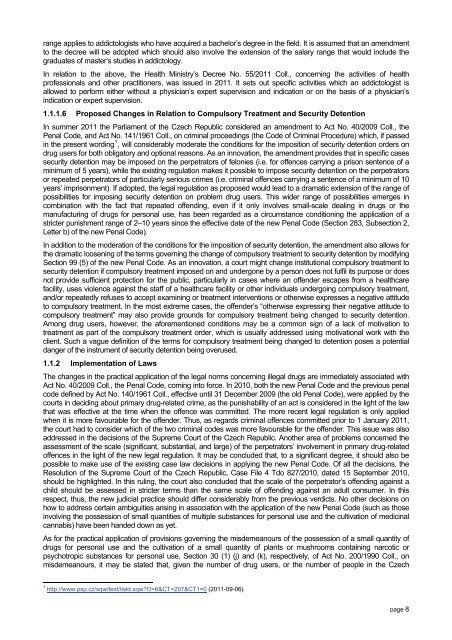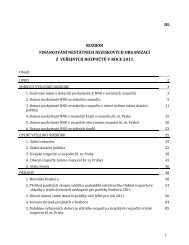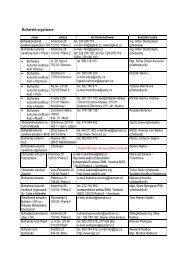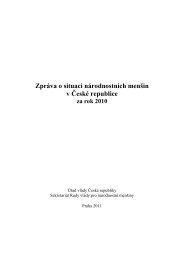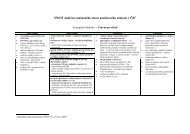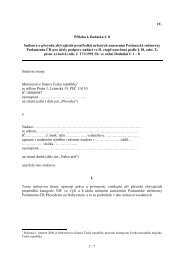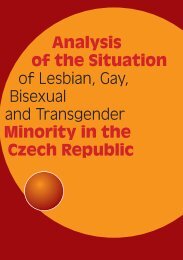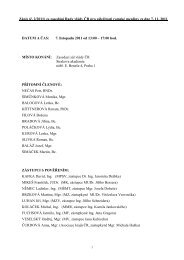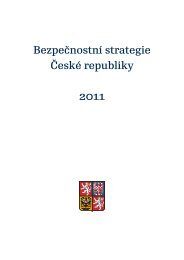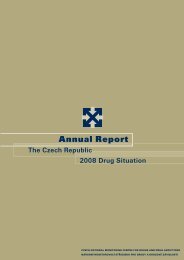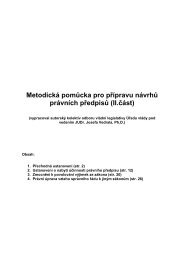The Czech Republic Annual Report 2010 Drug ... - Drogy-info.cz
The Czech Republic Annual Report 2010 Drug ... - Drogy-info.cz
The Czech Republic Annual Report 2010 Drug ... - Drogy-info.cz
You also want an ePaper? Increase the reach of your titles
YUMPU automatically turns print PDFs into web optimized ePapers that Google loves.
ange applies to addictologists who have acquired a bachelor’s degree in the field. It is assumed that an amendment<br />
to the decree will be adopted which should also involve the extension of the salary range that would include the<br />
graduates of master’s studies in addictology.<br />
In relation to the above, the Health Ministry’s Decree No. 55/2011 Coll., concerning the activities of health<br />
professionals and other practitioners, was issued in 2011. It sets out specific activities which an addictologist is<br />
allowed to perform either without a physician’s expert supervision and indication or on the basis of a physician’s<br />
indication or expert supervision.<br />
1.1.1.6 Proposed Changes in Relation to Compulsory Treatment and Security Detention<br />
In summer 2011 the Parliament of the <strong>Czech</strong> <strong>Republic</strong> considered an amendment to Act No. 40/2009 Coll., the<br />
Penal Code, and Act No. 141/1961 Coll., on criminal proceedings (the Code of Criminal Procedure) which, if passed<br />
in the present wording 1 , will considerably moderate the conditions for the imposition of security detention orders on<br />
drug users for both obligatory and optional reasons. As an innovation, the amendment provides that in specific cases<br />
security detention may be imposed on the perpetrators of felonies (i.e. for offences carrying a prison sentence of a<br />
minimum of 5 years), while the existing regulation makes it possible to impose security detention on the perpetrators<br />
or repeated perpetrators of particularly serious crimes (i.e. criminal offences carrying a sentence of a minimum of 10<br />
years’ imprisonment). If adopted, the legal regulation as proposed would lead to a dramatic extension of the range of<br />
possibilities for imposing security detention on problem drug users. This wider range of possibilities emerges in<br />
combination with the fact that repeated offending, even if it only involves small-scale dealing in drugs or the<br />
manufacturing of drugs for personal use, has been regarded as a circumstance conditioning the application of a<br />
stricter punishment range of 2–10 years since the effective date of the new Penal Code (Section 283, Subsection 2,<br />
Letter b) of the new Penal Code).<br />
In addition to the moderation of the conditions for the imposition of security detention, the amendment also allows for<br />
the dramatic loosening of the terms governing the change of compulsory treatment to security detention by modifying<br />
Section 99 (5) of the new Penal Code. As an innovation, a court might change institutional compulsory treatment to<br />
security detention if compulsory treatment imposed on and undergone by a person does not fulfil its purpose or does<br />
not provide sufficient protection for the public, particularly in cases where an offender escapes from a healthcare<br />
facility, uses violence against the staff of a healthcare facility or other individuals undergoing compulsory treatment,<br />
and/or repeatedly refuses to accept examining or treatment interventions or otherwise expresses a negative attitude<br />
to compulsory treatment. In the most extreme cases, the offender’s “otherwise expressing their negative attitude to<br />
compulsory treatment” may also provide grounds for compulsory treatment being changed to security detention.<br />
Among drug users, however, the aforementioned conditions may be a common sign of a lack of motivation to<br />
treatment as part of the compulsory treatment order, which is usually addressed using motivational work with the<br />
client. Such a vague definition of the terms for compulsory treatment being changed to detention poses a potential<br />
danger of the instrument of security detention being overused.<br />
1.1.2 Implementation of Laws<br />
<strong>The</strong> changes in the practical application of the legal norms concerning illegal drugs are immediately associated with<br />
Act No. 40/2009 Coll., the Penal Code, coming into force. In <strong>2010</strong>, both the new Penal Code and the previous penal<br />
code defined by Act No. 140/1961 Coll., effective until 31 December 2009 (the old Penal Code), were applied by the<br />
courts in deciding about primary drug-related crime, as the punishability of an act is considered in the light of the law<br />
that was effective at the time when the offence was committed. <strong>The</strong> more recent legal regulation is only applied<br />
when it is more favourable for the offender. Thus, as regards criminal offences committed prior to 1 January 2011,<br />
the court had to consider which of the two criminal codes was more favourable for the offender. This issue was also<br />
addressed in the decisions of the Supreme Court of the <strong>Czech</strong> <strong>Republic</strong>. Another area of problems concerned the<br />
assessment of the scale (significant, substantial, and large) of the perpetrators’ involvement in primary drug-related<br />
offences in the light of the new legal regulation. It may be concluded that, to a significant degree, it should also be<br />
possible to make use of the existing case law decisions in applying the new Penal Code. Of all the decisions, the<br />
Resolution of the Supreme Court of the <strong>Czech</strong> <strong>Republic</strong>, Case File 4 Tdo 827/<strong>2010</strong>, dated 15 September <strong>2010</strong>,<br />
should be highlighted. In this ruling, the court also concluded that the scale of the perpetrator’s offending against a<br />
child should be assessed in stricter terms than the same scale of offending against an adult consumer. In this<br />
respect, thus, the new judicial practice should differ considerably from the previous verdicts. No other decisions on<br />
how to address certain ambiguities arising in association with the application of the new Penal Code (such as those<br />
involving the possession of small quantities of multiple substances for personal use and the cultivation of medicinal<br />
cannabis) have been handed down as yet.<br />
As for the practical application of provisions governing the misdemeanours of the possession of a small quantity of<br />
drugs for personal use and the cultivation of a small quantity of plants or mushrooms containing narcotic or<br />
psychotropic substances for personal use, Section 30 (1) (j) and (k), respectively, of Act No. 200/1990 Coll., on<br />
misdemeanours, it may be stated that, given the number of drug users, or the number of people in the <strong>Czech</strong><br />
1<br />
http://www.psp.<strong>cz</strong>/sqw/text/tiskt.sqwO=6&CT=297&CT1=0 (2011-09-06)<br />
page 8


